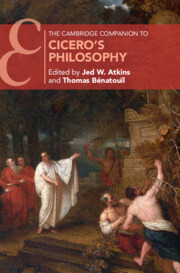
-
Select format
-
- Publisher:
- Cambridge University Press
- Publication date:
- December 2021
- December 2021
- ISBN:
- 9781108241649
- 9781108416665
- 9781108404037
- Dimensions:
- (228 x 152 mm)
- Weight & Pages:
- 0.63kg, 356 Pages
- Dimensions:
- (228 x 152 mm)
- Weight & Pages:
- 0.52kg, 356 Pages
You may already have access via personal or institutional login
Book description
Cicero is one of the most important and influential thinkers within the history of Western philosophy. For the last thirty years, his reputation as a philosopher has once again been on the rise after close to a century of very low esteem. This Companion introduces readers to 'Cicero the philosopher' and to his philosophical writings. It provides a handy port-of-call for those interested in Cicero's original contributions to a wide variety of topics such as epistemology, the emotions, determinism and responsibility, cosmopolitanism, republicanism, philosophical translation, dialogue, aging, friendship, and more. The international, interdisciplinary team of scholars represented in this volume highlights the historical significance and contemporary relevance of Cicero's writings, and suggests pathways for future scholarship on Cicero's philosophy as we move through the twenty-first century.
Reviews
‘Those with an interest in any aspect of Cicero's life and work, from historians studying his letters, philosophers studying his treatises, or classicists studying his style, would benefit from this volume. By understanding how his philosophy is integrated into the various aspects of his work and life, our picture of both Cicero and his philosophy improves, and we gain a greater appreciation for and understanding of his influence.’
Anthony Hejduk Source: Sehepunkte
Contents
Metrics
Altmetric attention score
Full text views
Full text views help Loading metrics...
Loading metrics...
* Views captured on Cambridge Core between #date#. This data will be updated every 24 hours.
Usage data cannot currently be displayed.
Accessibility standard: Unknown
Why this information is here
This section outlines the accessibility features of this content - including support for screen readers, full keyboard navigation and high-contrast display options. This may not be relevant for you.
Accessibility Information
Accessibility compliance for the PDF of this book is currently unknown and may be updated in the future.


